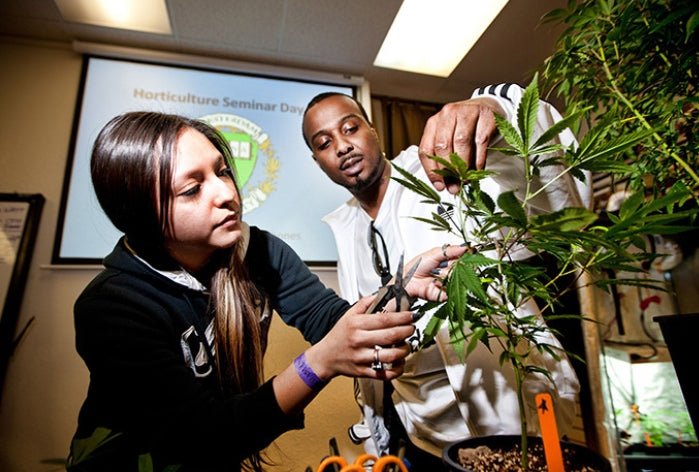While the first set of surveys centered on cultivation, processing, and manufacturing issues, the next round will focus on items such as pesticides, fertilizers, and environmental controls.

Despite still not having a full-time director, the Minnesota Office of Cannabis Management is working hard to lay the foundation for establishing the rules and regulations governing the state’s newly legalized adult-use cannabis market.
At the end of October, the state's Office of Cannabis Management (OCM) released the first of five online surveys to gather public input to aid officials in crafting those guidelines necessary to facilitate Minnesota's marijuana industry. That first questionnaire focused primarily on feedback related to cultivation, processing, and manufacturing issues.
Now, as first reported by Marijuana Moment, officials at the OCM have opened a second survey round to collect information related to pesticides, fertilizers, and environmental controls. At the same time, they are also celebrating the hundreds of responses gathered from the first survey.
With the OCM receiving more than 700 responses from that initial survey, the office said it was able to gather valuable perspectives on how to support small businesses effectively, navigate supply chains, and provide reliable lab testing services.
According to OCM officials, several “themes” emerged due to the initial survey. One particular issue that stood out was that “clarity is needed regarding the role of the home grower in the larger cannabis marketplace,” it said.
Other critical takeaways include:
- Technical support for growers and processors—specifically to teach skills and methods to those new to the industry.
- Establishing cultivation businesses is essential to supply future processing, manufacturing, and retail market needs.
- To ensure a credible and safe market, better access to and reliability of laboratory testing and related testing records is paramount.
- Processing and manufacturing requirements should rely on systems-based control approaches similar to those used in industries like food and pharmaceuticals.
The second survey, which regulators emailed last week, aims to open up the conversation regarding “testing, environmental controls, and pesticides and fertilizers.”
The survey prompts participants to select a specific category, such as pesticides, laboratory testing, or environmental controls, and then provide answers to open-ended questions regarding opportunities, concerns, technical development considerations, and any other topics they would like officials to consider during the rulemaking process.
“OCM will gather input through surveys on a variety of topics as the agency begins drafting rules to ensure the rulemaking process is accessible to the widest possible range of community members, advocates, and partners who want to help shape how the rules are drafted,” the office said.
"OCM will gather input through surveys on a variety of topics as the agency begins drafting rules to ensure the rulemaking process is accessible to the widest possible range of community members, advocates, and partners who want to help shape how the rules are drafted.”
- The Minnesota Office of Cannabis Management
In the coming weeks, future surveys will focus on retail business operations and standards (December 15-28), packaging, labeling, and tracking systems (December 29-January 12), and licensing and social equity considerations (January 13-26). Furthermore, the OCM has also promised additional outlets for consumer and stakeholder feedback.
“OCM will offer other opportunities to be involved in the rulemaking process through in-person and virtual meetings. Those will be announced in the coming months.” the office said.
"OCM will offer other opportunities to be involved in the rulemaking process through in-person and virtual meetings. Those will be announced in the coming months.”
- The Minnesota Office of Cannabis Management
Once regulators have gathered all the necessary information from the surveys, the OCM will formally propose the new rules governing the regulated market. Members of the general public will then be allowed to weigh in with their thoughts and concerns regarding the regulations. That process will likely take place next fall.
Until then, Minnesotans over 21 are already legally allowed to consume, possess, and cultivate cannabis plants for personal use. Likewise, individuals close enough to or willing to drive to the Red Lake or White Earth Nations can purchase cannabis products from retail dispensaries located on their respective Native American reservations.
While the regulatory effort in Minnesota may have gotten off to a rocky start, with the abrupt and startling resignation of its first director, Erin Dupree, less than 24 hours after her appointment, due to allegations that she sold hemp-derived THC products that exceeded state limits on potency, the ship appears to be back on course.
And with state lawmakers approving the OCM’s use of an expedited rulemaking process, the hope is that the first retail licenses can be issued by early 2025. Between now and then, it will be crucial for all parties involved to stay focused and vigilant. The Minnesota recreational cannabis market is expected to exceed $1.5 billion by 2029. Missteps like the Dupree appointment cannot be repeated if state officials, cannabis businesses, and the general public want to see Minnesota’s adult-use marijuana industry flourish and thrive.







































